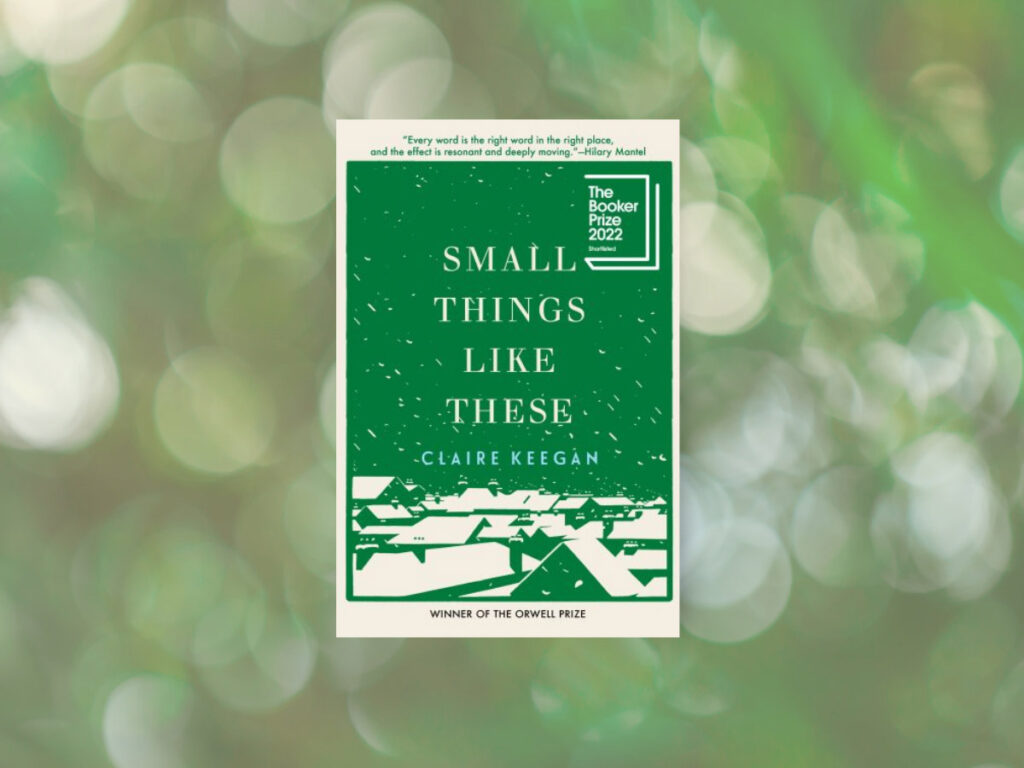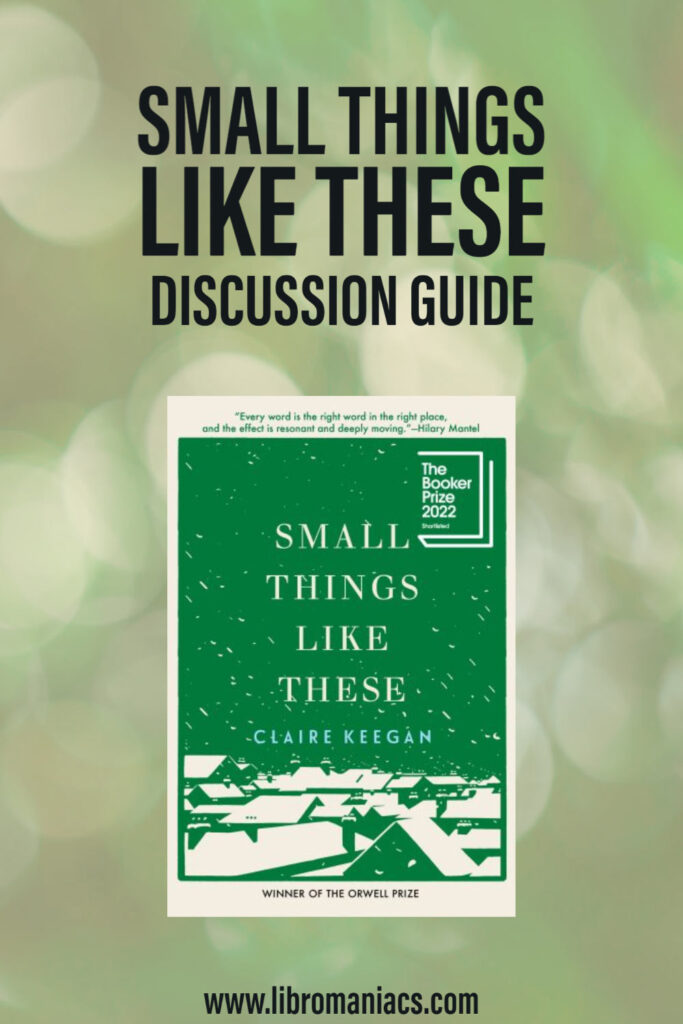How does such a small book bear the weight of such large themes? Well, that’s what you’ll talk about with the help of these Small Things Like These book club questions.
Although the bulk of this slim volume covers a fairly narrow time period in Bill Furlong’s life, Keegan give you the full measure of the man. She covers themes like, what it means to grow up as an outsider, how family obligations can be both fulfilling and stifling in equal measure, the ability of powerful institutions to fail completely, and what it means to stand up for those who need it.
Our Small Things Like These discussion guide will help you navigate those themes with 10 discussion prompts, a synopsis and some interesting review snippets. And if you loved the book, we’ve also got some suggestions for related reads.

(This article contains affiliate links. This means that if you choose to purchase, I’ll make a small commission.)
Small Things Like These Synopsis
(We always chose to provide the publisher synopsis because we feel that it’s worthwhile to discuss whether the official book description actually squared with your experience of the book.)
Small Things Like These, Claire Keegan
It is 1985 in a small Irish town. During the weeks leading up to Christmas, Bill Furlong, a coal merchant and family man faces into his busiest season. Early one morning, while delivering an order to the local convent, Bill makes a discovery which forces him to confront both his past and the complicit silences of a town controlled by the church.
10 Small Things Like These Book Club Questions
- This book is small and spare. Discuss Keegan’s writing style. How did she pack such a powerful story into such a small package?
- Furlong had no father in his life and seemed to feel the loss keenly. How do you think his upbringing, which was unusual for the time, affected the choices he made later in the story?
- Alternatively, do you believe that Ned is Furlong’s father? And if so, why did Ned never say anything?
- Eileen has a very defensive response to Furlong’s report about the convent. “Where does thinking get us…all thinking does is bring you down.”
Bill is warned by both his wife and Mrs. Kehoe to stay clear of what was going on at the convent. How is it that the women knew more about the convent than the men? Why does the convent have so much power? - “Of late, he was inclined to imagine another life, elsewhere, and wondered if this was not something in his blood.” Where’s Furlong’s melancholy coming from?
- “…was there any point in being alive without helping one another? Was it possible to carry on along through all the years, the decades, through an entire life, without once being brave enough to go against what was there and yet call yourself a Christian, and face yourself in the mirror?”
Have you ever had a moment like this? One that forced you to make the uncomfortable choice? - At the end of the book, Furlong acknowledges that there will be consequences for his actions, but as a reader, we aren’t told what they’ll be. What do you think will happen? What do you hope will happen?
- In the opening epigraph there is a passage from The Proclamation of the Irish Republic of 1916. It says “…The Republic guarantees religious and civil liberty, equal rights and equal opportunities to all its citizens […] to pursue happiness and prosperity […] cherishing all of the children of the nation equally”.
This certainly doesn’t square with the events of the book. How have Ireland’s, or indeed even our own nation’s ideals sometimes failed to deliver on the promise? - After a passage highlighting Furlong’s pride in his kids and the hardship that some in town are facing, Keegan writes, “Some night like these, Furlong lay there with Eileen, going over small things like these.”
How are the titular “small things like these”, the things comprise a life? What are some of the small but significant things in your life? - Prior to reading this book, how much did you know about the Magdelene laundries and other abuses by the Catholic Church in Ireland?
Selected Reviews for Small Things Like These
“Small but mighty! Quietly understated yet screaming to be heard! I adored this book and can’t wait to re-read it and anything else Claire Keegan publishes. So gorgeous”
“[…] I’m dismayed to report this didn’t hold up on a re-read. The spell has been broken. In fact I’m not sure what had enthralled me so much the first time around. I found it overly sentimental and the ending too cute. Almost like a made-for-tv holiday movie […]”
“This is a read that enraged and made me want to weep, it’s hard to believe such evil survived until 1996, the Church aided in perpetuating their criminal behaviour, the murders and injustices, by the Irish State. A hard hitting, poignant, and beautifully written book on the darkness in Ireland’s history.”
“Claire Keegan has the incredible ability to take a seemingly ordinary story and, without fluff or fanfare, turn it into something extraordinary. The characters are deep and the tale is touching. I did feel the ending was a bit abrupt, which is why I’ve given a 4.5 rating instead of the full five stars.”
3 Books Like Small Things Like These
Keegan was shortlisted for the Booker Prize for this book. If you have a thing for the Bookers, we have more guide for prize winners: Klara and the Sun book club guide (Kazuo Ishiguru), The Testaments book club guide (Margaret Atwood), and Girl Woman Other book club guide (Bernadine Evaristo).
And if you liked the chilly, moody setting, we got a whole list of fiction books set in the Republic of Ireland, fiction set in Northern Ireland, and mysteries set in Ireland.

The Department of Speculation, Jenny Offill
Like Small Things, this book is short, spare and features brewing difficulties between a married couple.
The “wife” pulls us through the story of her marriage using a series of letters as a plot device. You get fragments of her life…vignettes really…punctuated by moments of doubt, philosophical musings, a shocking betrayal, and the hard compromises one has to make when married.

The Magdalen Girls, V.S. Alexander
If you want to learn more about the Magdalene laundries, this is the book for you.
In it, we meet Nora and Teagen, both have been assigned to (imprisoned) in a laundry for what today we could consider ridiculously inoffensive behaviors. Through their toils, they befriend one another, support one another, and together they hatch an escape plan. The book does a good job of detailing the cruelty and hardships faced by the women and girls who were enslaved by the system.

To Die Beautiful, Buzzy Jackson
To Die Beautiful is a good pick if you want more melancholy, and characters who have to make hard choices to do what’s right.
Jackson captures Dutch life under a Nazi yoke with all the hardships, the deprivation, the horrors and the cruelty which never ceases to shock to the core. The main character Hannie, is a shy law student. When two of her Jewish friends are threatened, she must summon her outrage, strength, and all of her humanity to resist the Nazis.
Have a listen on Audible. Try audio books for free for 30 days.
Share these Small Things Like These book club questions with your friends:

